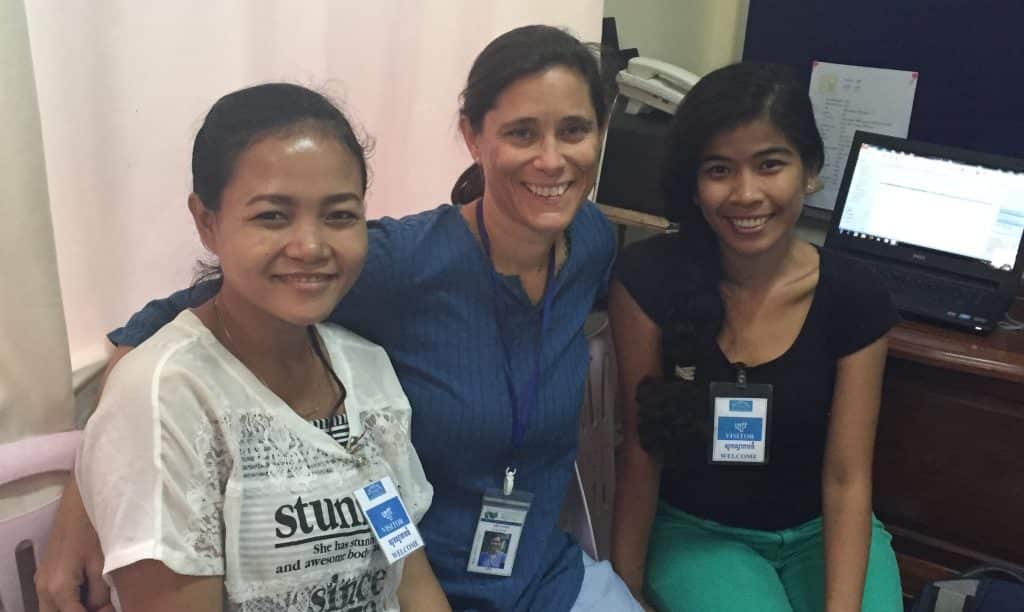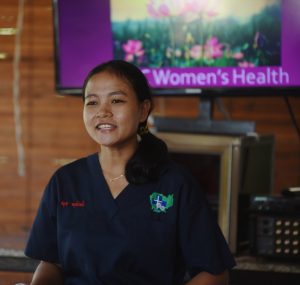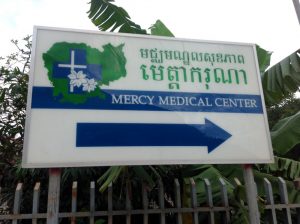Cambodia faces a cervical cancer epidemic. With one of the world’s highest rates of cervical cancer deaths and the highest in Asia, Cambodian women need a champion to help bring screening and treatment. Dr. Judy Norman is that champion. Her goal: to empower Cambodian women to become their own champion.
Cambodia has one of the world’s highest rates of cervical cancer deaths, and the highest in Asia
“When I came to Cambodia, I didn’t want to be another foreign doctor to do good for a while and then leave nothing. I wanted to make lasting change” Dr. Norman explains.
While she certainly has not finished her work, the impact of her efforts has already started to spread.

Mercy Medical Center Cambodia Women’s Health Program
Dr. Norman heads the Women’s Health Program at the Mercy Medical Center Cambodia (MMCC), in Phnom Penh. She’s one of the 12 expatriate physicians and nurses leading the educational programs at MMCC with the goal of creating sustainable, locally led healthcare.
The lack of affordable and quality healthcare, local corruption, and widespread human trafficking have combined to create a range of healthcare issues in Cambodia. It is not possible for twelve clinicians to treat an entire country. However, through residency and fellowship programs for Cambodian trained physicians, MMCC is training a new generation of physicians who will return to their home provinces, bringing medical best practice throughout the country.
The training program is carefully designed to fit the economic and social reality in Cambodia to ensure healthcare efforts meet the unique needs of the population. Many approaches that might work well in high-resource settings or even urban centers in Cambodia, will not work in rural Cambodia. Laboratories, equipment, and supplies may not always be available, or cost more than most of the population can afford.
“Our aim is to do as much as possible for the lowest cost possible,” Dr. Norman explains.
“In terms of women’s health, that means we perform high-quality VIA instead of Pap and colposcopy.” But still, women get the treatment they need, even if there is some overtreatment without the Pap and biopsy.
Respect is key to women’s healthcare
Mercy Medical Center Women’s Health division works together with referral partners treating women from around Cambodia. Their client base is varied with both rural farmers and  urban sex workers receiving a warm welcome at Mercy Medical Center.
urban sex workers receiving a warm welcome at Mercy Medical Center.
Patient experience is emphasized at MMCC. Group education sessions are conducted in the out-patient clinic, giving women an understanding of the screening process, and in turn giving them greater ownership over their healthcare. Women receive treatment from local Khmer speaking physicians, who have the linguistic and societal sensitivity needed to put patients at ease.
Many patients are greatly moved by the standard of care they receive. “In Cambodia, patients are used to the respect they receive to be proportional to their economic status,” Dr. Norman shares. “Impoverished patients are shocked to arrive at Mercy Medical Center and be treated with respect and warmth by physicians.”
The work at the Women’s Health Care Program is threefold: providing screening for women referred to the clinic; training clinicians to perform VIA and cervical exams, and offering community education about the importance of cervical cancer screening.
Combating cervical cancer in Cambodian sex workers
The rampant sex trade and high rates of trafficking in Cambodia is a contributory factor to the high rates of cervical cancer. Research through USAID and local NGOs estimates that 90% of Cambodian men are consumers of the sex trade industry. This puts women throughout Cambodia at high risk for sexually transmitted diseases, including HPV infection, even if they only have one partner.
Dr. Norman confesses that not every aspect of her work is easy, “I think I cried every day for the first two years. It’s devastating to see some of the things that happen here.” The rampant sex trade in Cambodia comes at a great cost, both to those directly involved and in the wider society. Cambodia sees many women suffering from more aggressive forms of cervical cancer than in some other settings.
The MMCC Women’s Health Program works closely with other NGOs dealing directly with sex workers and victims of human trafficking, ensuring that the physical healing from their experience can start immediately.
The concern shown by the staff also helps to start the long journey towards psychological healing. “For so many of these human trafficking survivors, just being treated with concern and care is incredibly healing. To find our whole staff dedicated to taking care of them seems unbelievable after their previous experiences.”
Training program for sustainable change
The MMCC Women’s Health Program trains clinicians, both doctors, and midwives, in VIA using the EVA System digital colposcope, a handheld mobile device that captures digital images of the cervix. The interface of the EVA System, which looks similar to a smartphone simplifying the training process. Supervising staff can review recorded images to ensure quality control over the program, and that residents continue improving their diagnostic accuracy over time. Dr. Norman explains, “This system gives our doctors the confidence to carry out exams in a variety of situations. They are able to tell women that they are preventing cancer with a confidence they wouldn’t have had otherwise.”
 Dr. Norman did not want to train physicians on equipment that wouldn’t be applicable once they returned to their local practices. The MMCC program not only selected a colposcopy system versatile enough to work in any setting for the training process; they are sending the equipment home with the residents once trained. With funding from several private grants, MMCC Women’s Health has committed to sending EVA Systems into the field to the home provinces of the trainees.
Dr. Norman did not want to train physicians on equipment that wouldn’t be applicable once they returned to their local practices. The MMCC program not only selected a colposcopy system versatile enough to work in any setting for the training process; they are sending the equipment home with the residents once trained. With funding from several private grants, MMCC Women’s Health has committed to sending EVA Systems into the field to the home provinces of the trainees.
Coupling physician education with the necessary equipment, MMCC is building a lasting network of cervical cancer screening throughout Cambodia.
The challenge to lower the cervical cancer rate in Cambodia is large. Meeting this challenge requires active engagement of local physicians and patients. The Mercy Medical Center Cambodia not only treats women today; they are creating the infrastructure needed for tomorrow.







